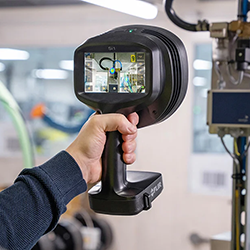For more than a quarter century Lean Manufacturing has been focused on plant floor process improvement. While these efforts have eliminated waste in the operation, rarely have pricing elements been considered part of a value stream mapping (VSM).
 Lean Manufacturing Now Focuses on Pricing During Pandemic
Lean Manufacturing Now Focuses on Pricing During Pandemic

Lydia Di Liello, CEO and Founder | Capital Pricing Consultants
For more than a quarter century Lean Manufacturing has been focused on plant floor process improvement. While these efforts have eliminated waste in the operation, rarely have pricing elements been considered part of a value stream mapping (VSM). COVID has accelerated why manufacturers must consider pricing as a central theme in continuous process improvement.
Recently, Kevin Mitchell, President of Professional Pricing Society (PPS) shared why pricing considerations are more essential now than ever before.
.png) About Kevin Mitchell
About Kevin MitchellIn addition to his role in PPS, Mitchell is also the publisher of The Pricing Advisor a monthly newsletter and the quarterly Journal of Professional Pricing. Mitchell is a frequent speaker at pricing conferences and events in North America, South America, Europe, and Asia where he often discusses trends and demographic changes within the pricing discipline. Before joining PPS in 2007, Mitchell worked for eleven years in various Financial Management fields with Colgate-Palmolive and General Electric. He has BA degrees in Economics and English from Duke University and an MBA in Marketing from The William E. Simon Graduate School of Business at the University of Rochester.
Lydia Di Liello: What does PPS see the current state of pricing for the manufacturing sector?
Kevin Mitchell: The PPS Pricing Power Index was only 6.4 on a 1-to-10 scale in our last survey. This means that members felt they had only a moderate level of pricing power in their industries. Tough times may be around for a while and pricing’s importance grows as margins shrink; 1% increase means much more with smaller margins. Software providers and consultants will expand offerings to address these challenges for smaller and mid-sized industrial companies. Pricing as a function is using data and analytics to a much stronger level. More companies will develop a Pricing Center of Excellence and look for a center-led organizational structure with pricing.
Lydia Di Liello: Because manufacturers are familiar with Lean Manufacturing and Lean Six Sigma principles, is pricing management easily transitioned to facilitate a best-practice process?
Kevin Mitchell: Absolutely. Strong pricing management and great pricing acumen lead manufactures to the availability of additional funds for research and development, recruiting and training, marketing, product development, and other ways to make team members productive.
Lydia Di Liello: What percentage of PPS members are in the manufacturing and industrial sectors?
Kevin Mitchell: Manufacturers are one of our largest pluralities of PPS members worldwide.
Lydia Di Liello: How has COVID changed PPS for the manufacturing sector?
Kevin Mitchell: For the first time in over 30 years, we will not have an in-person conference in 2020. That said, PPS is offering special programs, webinars, and articles about dealing with the pandemic. There are increased offerings to members without increasing prices for membership as a special bonus to those who continue with PPS in spite of reductions in company travel and training budgets. PPS employees can work from home until it is 100% safe to return to the office
Lydia Di Liello: What are some of the leading pricing mistakes manufacturers have made during COVID?
Kevin Mitchell: Some people think that sales volume will automatically increase in lockstep with a reduction in price; this does not consider the marketplace nor competitors’ responses. Manufacturers who reduce prices may trigger a similar competitive response; the end result being that everyone has about the same share of a much smaller pie and no one really wins. Some see the pandemic as an opportunity for price gouging, but pricing practices that are considered “unfair” are a recipe for disaster in the long-term, and maybe the short-term as well.
The Fall Virtual Conference will take place from October 20-28
Lydia Di Liello: Next month is the Professional Pricing Society virtual conference. We understand that an increasing number of manufacturers will attend. Please share some of the anticipated take-aways from the event?
Kevin Mitchell: This event will help manufacturers navigate pricing strategies and tactics to help companies survive and thrive during these turbulent times. There will be reminders that in spite of all the pressures, this is not the time to panic. Difficult times should not mean that manufacturers should start a self-defeating price war. During COVID more manufacturers are using a variety of new analytical tools and ways of doing business. Current conditions require manufacturers stay current with the marketplace and customer demand.
.png) About Lydia Di Liello
About Lydia Di Liello
Lydia Di Liello is the CEO and founder of Capital Pricing Consultants, a revenue management and business consultancy dedicated to significantly improving profitability for clients through strategic, operational, and tactical analysis and recommendations. Di Liello brings more than 25 years of global revenue management and pricing expertise. She is a member of the Professional Pricing Society Board of Advisors and holds an MBA from Youngstown State University.
The content & opinions in this article are the author’s and do not necessarily represent the views of ManufacturingTomorrow
Comments (0)
This post does not have any comments. Be the first to leave a comment below.
Featured Product

